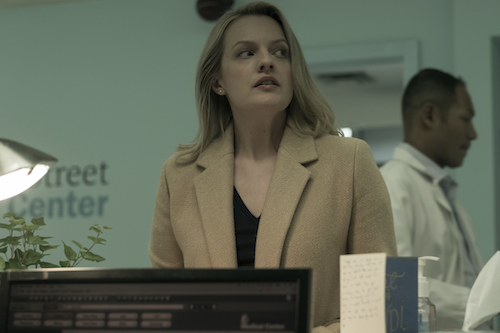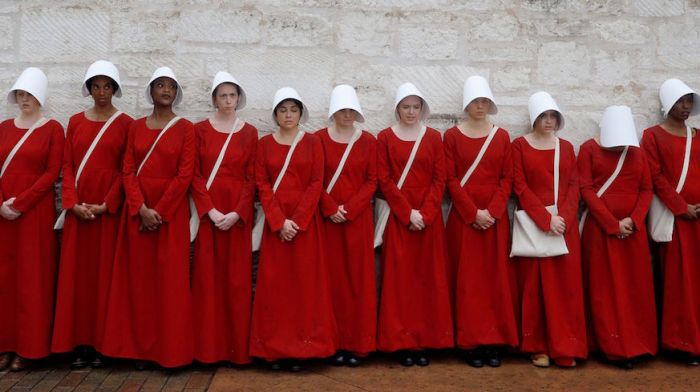There’s a heartbreaking scene in season two of The Handmaid’s Tale where Emily (Alexis Bledel) is left behind at the airport, her family traveling on to Canada. Mentioned in season one, it’s hardly a spoiler, but so gut wrenching was the flashback I immediately texted my husband: we need to sort our daughter’s dual citizenship — just in case.
This the power of The Handmaid’s Tale; a show that makes viewers take an uncomfortable look at the parallels between everyday life in America, and the fictional theocracy of Gilead — and consider what if? As the new season begins, it’s worth asking: just how different are we to Gilead?
“Under His Eye”: Privacy
In Gilead, the phrase ‘Under his Eye’ reminds characters they’re under the judgment of god, but also reinforces the fear that the secret police are watching.
In Gilead, the phrase ‘Under his Eye’ reminds characters they’re under the judgment of god, but also reinforces the fear that the secret police are watching.
From surveillance cameras in 7-11s to full body scans at airports, everyday privacy has slowly been eroded for ‘the greater good.’ However, the recent Cambridge Analytica scandal established there’s always someone watching where you are, who you’re with and what you’re doing — just like in Gilead.
“Blessed be the Fruit” — Abortion
But beyond watching you, there are some who’d like to control you. In Gilead, abortion is considered murder. In the US, the Senate recently rejected a bill banning late-term abortion; but that hasn’t stopped the extreme right.
But beyond watching you, there are some who’d like to control you. In Gilead, abortion is considered murder. In the US, the Senate recently rejected a bill banning late-term abortion; but that hasn’t stopped the extreme right.
In Idaho, a three-term state senator suggested the death penalty for abortion. Over in Ohio, Bill HG565 takes this further, suggesting criminal charges against medical doctors performing abortions — much like the hanging corpse of the abortion doctor on the wall in Gilead.

Season 2, Credit: Take Five
“May the Lord Open” — Complacency
It’s easy to shake your head and ignore career politicians. However, The Handmaid’s Tale is a powerful commentary on the danger of complacency.
It’s easy to shake your head and ignore career politicians. However, The Handmaid’s Tale is a powerful commentary on the danger of complacency.
“I guess you kind of get used to things being one way” says Janine, as she scrubs blood from the walls. She has a point: today, things once remarkable, like removing your shoes at airports, or enduring the tantrum-fueled tweets of elected officials, remain tedious, but have become predictable and expected.
“Nothing changes instantaneously,” says Offred. “In a gradually heating bathtub, you’d be boiled to death before you knew it.”
“Nolite te Bastardes Carborundorum, bitches” — Resistance
Of course, plenty of people are noticing change — and resisting. From Black Lives Matter to #metoo, and the teens pushing back with #riseup, ordinary Americans are standing up to the patriarchy. Don’t let the bastards get you down, writes Offred’s predecessor in an act of rebellion, a message that keeps Offred from despair.
Of course, plenty of people are noticing change — and resisting. From Black Lives Matter to #metoo, and the teens pushing back with #riseup, ordinary Americans are standing up to the patriarchy. Don’t let the bastards get you down, writes Offred’s predecessor in an act of rebellion, a message that keeps Offred from despair.
“There was an Offred before me” — History
While Margaret Atwood’s original book was based on a loose collection of historical events, one of the TV series’ most chilling plot developments is the discovery that handmaidens are Gilead’s most valuable export.
While Margaret Atwood’s original book was based on a loose collection of historical events, one of the TV series’ most chilling plot developments is the discovery that handmaidens are Gilead’s most valuable export.
While it might seem like fiction, globally human trafficking is a $32 billion dollar industry. According to the International Labor Organization, there are over 4.5 million people experiencing forced sexual exploitation. The fictional fate of the handmaidens is a grim reality for many women.
“Go In Grace”
As Aunt Lydia says, “Ordinary is just what you’re used to.”
As Aunt Lydia says, “Ordinary is just what you’re used to.”
Don’t get used to ordinary.
























